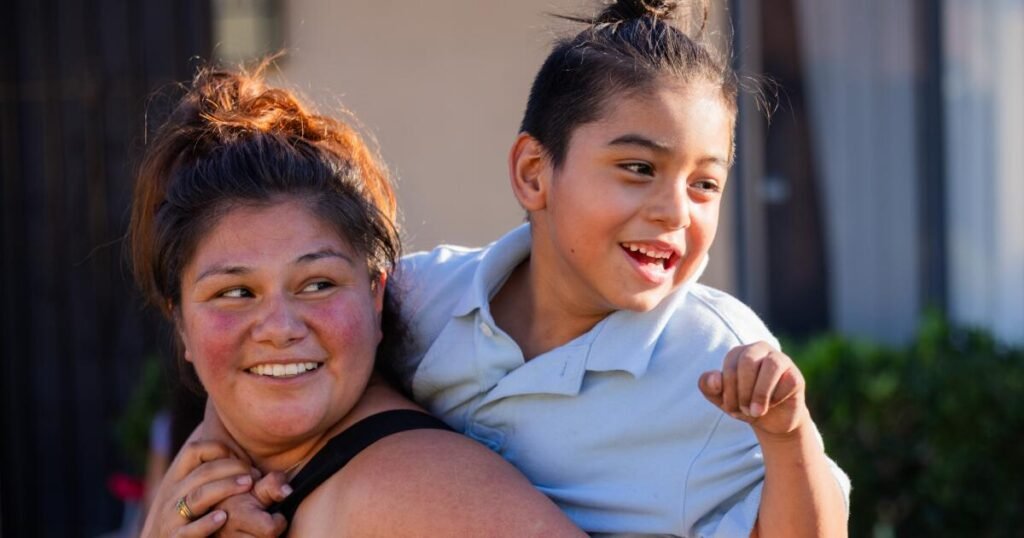Elijah’s Story and Medicaid Cuts
Elijah Maldonado, born just under three years ago, has required specialized medical care that his family could only access through public programs. He was diagnosed with cerebral palsy as an infant and spent his early months in a public hospital in Orange County. Now seven years old, Elijah participates in physical and speech therapy, with those services funded by Medicaid. He relies on government-provided wheelchairs, and assistants paid by taxpayer money help ensure his safety as he travels to school.
Each month, Elijah’s family receives a $957 disability check to help cover living costs. Despite being on the brink of forming clear sentences, Elijah uses the Proloquo speech app on an iPad from his school to communicate basic needs, like hunger or playing with toys. His aunt, Cassandra Gonzalez, who is his primary caregiver, also receives compensation through taxpayer funding.
However, this support is now at risk due to pending legislation known as the “One Big Beautiful Bill Act.” This bill, supported by Republican lawmakers, proposes significant cuts to Medicaid and food assistance, with reductions to federal spending expected to reach about $1 trillion over the next decade. Some of these cuts are anticipated to be implemented within just weeks.
In response, California’s Governor Gavin Newsom has criticized the proposal, suggesting it disproportionately harms vulnerable populations like cancer patients and working families. Public health officials in Los Angeles estimate that nearly 40% of the population relies on Medi-Cal, the state’s Medicaid program, and forecast a $750 million annual budget cut to services that support critical health needs.
These anticipated reductions in funding could impact approximately 1.7 million Californians by 2034. Notably, the Supplemental Nutrition Assistance Program (SNAP), commonly referred to as food stamps, faces a cut exceeding $280 billion over the next decade, according to projections.
As federal agencies provide limited guidance on implementing these changes, many low-income individuals—children, the elderly, the disabled, and veterans—could struggle to access healthy food and necessary medical care. The impact of cuts to programs like CalFresh could affect millions of households in California.
In Orange County, where Elijah’s family resides, officials are already feeling the pinch from federal spending reductions. Several programs, including those focusing on family planning and nutrition for women and children, have experienced significant funding cuts. Dr. Veronica Kelley, from the OC Healthcare Agency, notes efforts to prevent layoffs by reallocating staff or involving nonprofit organizations but warns about longer-term sustainability issues.
Concerns have risen from organizations like Kaiser Permanente regarding the growing number of uninsured individuals delaying necessary care due to financial barriers. This could lead to worse health outcomes and increased reliance on emergency services.
Josephine Rios, Elijah’s grandmother who works at Kaiser Hospital, has witnessed the stress firsthand as patients rush to schedule medical procedures to avoid losing Medicaid benefits. Earlier this year, she joined fellow health workers to urge lawmakers to reconsider these cuts.
Even after making appeals, Josephine recalls how local representatives ultimately supported the budget bill, claiming it was beneficial for Californians.
Now, Josephine often watches Elijah engage with his iPad and enjoy media, feeling a mix of emotions. Although they appreciate the support systems that exist within their family, they recognize that many others lack such resources. Samantha, Elijah’s mother, juggles work and her children’s needs but is worried about losing financial support. The potential loss of Elijah’s monthly Social Security benefits adds to her anxiety, as those funds are crucial for groceries and essential supplies.
Reflecting on the overall situation, Samantha and her family highlight the struggle to maintain a decent living amidst service cuts. They’re aware that others, without strong family networks, may face even graver challenges. “What will happen to families who don’t have support like ours?” Samantha asks. Indeed, with uncertain financial futures, many have started to feel that their basic needs are slipping just out of reach.
“We’re not looking for extravagance, just stability,” Cassandra remarked. Both women express frustration over the lack of empathy in discussions surrounding healthcare and the moral responsibility of supporting those in need. “Humanity,” Samantha said, “we lack that.”







